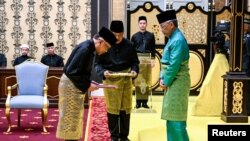Longtime opposition leader Anwar Ibrahim was sworn in as Malaysia's prime minister Thursday in a victory for political reformers who were locked in a battle with Malay nationalists for days after a divisive general election produced a hung Parliament.
Anwar took his oath of office in a simple ceremony at the national palace that was broadcast on national television.
Malaysia's king, Sultan Abdullah Sultan Ahmad Shah, named Anwar, 75, as the nation's 10th leader after saying he was satisfied that Anwar is the candidate who is likely to have majority support.
"I will take on this responsibility entrusted to me with humility and responsibility," Anwar tweeted later.
Anwar's Alliance of Hope led Saturday's election with 82 seats, short of the 112 needed for a majority. An unexpected surge of ethnic Malay support propelled Former Prime Minister Muhyiddin Yassin's right-leaning National Alliance to win 73 seats, with its ally Pan-Malaysian Islamic Party emerging as the biggest single party with 49 seats.
The stalemate was resolved after the long-ruling bloc led by the United Malays National Organization agreed to support a unity government under Anwar. Such a tieup was once unthinkable in Malaysian politics, long dominated by rivalry between the two parties. Other influential groups in Borneo island have said they will follow the king's decision.
"His Royal Highness reminds all parties that the winners do not win all and the losers do not lose everything," a palace statement said. The monarch urged Anwar and his new government to be humble and said all opposing parties should reconcile to ensure a stable government and end Malaysia's political turmoil, which has led to three prime ministers since 2018 polls.
The statement gave no details on the government that will be formed. The stock market and the Malaysian currency rose strongly following news of Anwar's appointment.
Muhyiddin, 75, has refused to concede defeat. At a news conference, he challenged Anwar to prove he has the majority support of lawmakers to deflect doubts over his leadership.
Police have tightened security nationwide as social media posts warned of racial troubles if Anwar's multiethnic bloc won. Anwar's party has urged supporters to refrain from celebratory gatherings or issuing sensitive statements to avoid risk of provocation.
Anwar's rise to the top caps his roller-coaster political journey and will ease fears over greater Islamization. But he faces a tall task in bridging racial divides that deepened after Saturday's poll, as well as reviving an economy struggling with rising inflation and a currency that has fallen to its weakest point. Malays form two-thirds of Malaysia's 33 million people, which include large ethnic Chinese and Indian minorities.
"He will have to make compromises with other actors in the government that means that the reform process will be a more inclusive one," said Bridget Welsh, a Southeast Asia political expert at the University of Nottingham Asia Research Institute Malaysia. "Anwar is a globalist, which will assure international investors. He has been seen to be a bridge builder across communities, which will test his leadership moving forward but at the same juncture offers a reassuring hand for the challenges that Malaysia will face."
Anwar was a former deputy prime minister whose sacking and imprisonment in the 1990s led to massive street protests and a reform movement that became a major political force. Thursday marked his reformist bloc's second victory — its first being historic 2018 polls that led to the first regime change since Malaysia's independence from Britain in 1957.
Anwar was in prison at the time on a sodomy charge he said was politically motivated. He was pardoned and was due to take over from Mahathir Mohamad. But the government collapsed after Muhyiddin defected and joined hands with UMNO to form a new government. Muhyiddin's government was beset by internal rivalries and he resigned after 17 months. UMNO leader Ismail Sabri Yaakob was then picked by the king as the prime minister.
Many rural Malays fear they may lose their privileges with greater pluralism under Anwar. Fed up with corruption and infighting in UMNO, many opted for Muhyiddin's bloc in Saturday's vote.




